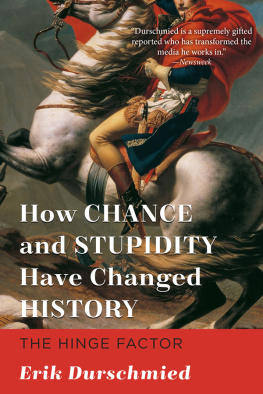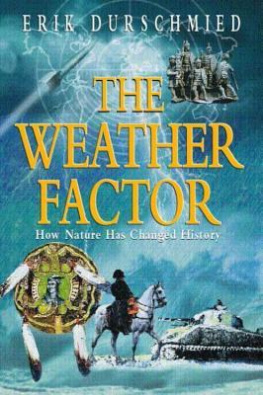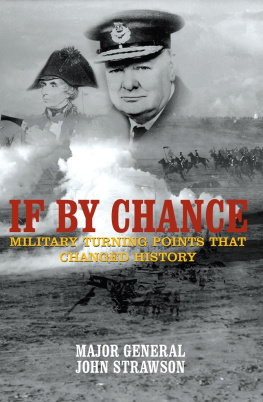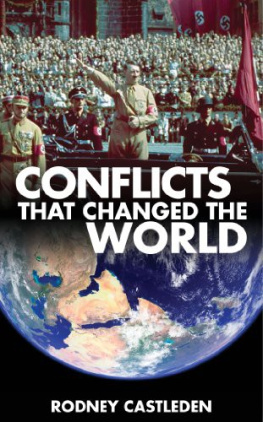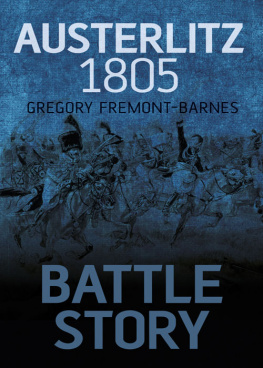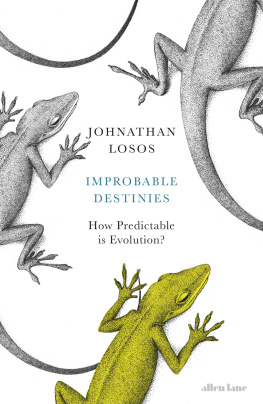
Copyright 2000, 2011, 2016 by Erik Durschmied
All rights reserved. No part of this book may be reproduced in any manner without the express written consent of the publisher, except in the case of brief excerpts in critical reviews or articles. All inquiries should be addressed to Arcade Publishing, 307 West 36th Street, 11th Floor, New York, NY 10018.
This Arcade Publishing paperback edition 2016
Copyright material from Pursuit by Ludovic Kennedy reprinted by permission of The Peters Fraser & Dunlop Group Limited.
Arcade Publishing books may be purchased in bulk at special discounts for sales promotion, corporate gifts, fund-raising, or educational purposes. Special editions can also be created to specifications. For details, contact the Special Sales Department, Arcade Publishing, 307 West 36th Street, 11th Floor, New York, NY 10018 or .
Arcade Publishing is a registered trademark of Skyhorse Publishing, Inc., a Delaware corporation.
Visit our website at www.arcadepub.com.
10 9 8 7 6 5 4 3 2 1
Library of Congress Cataloging-in-Publication Data
Names: Durschmied, Erik.
Title: How chance and stupidity have changed history : the hinge factor / Erik Durschmied.
Other titles: Hinge factor
Description: Paperback edition. | New York : Arcade Publishing, 2016. | Includes bibliographical references and index.
Identifiers: LCCN 2016016227 (print) | LCCN 2016017622 (ebook) | ISBN 9781628726435 (pbk. : alk. paper) | ISBN 9781628726442 (ebook)
Subjects: LCSH: History--Miscellanea. | Military history--Miscellanea. | Battles--History. | Chance--History. | Stupidity--History.
Classification: LCC D24 .D87 2016 (print) | LCC D24 (ebook) | DDC 900--dc23 LC record available at https://lccn.loc.gov/2016016227
Cover design by Laura Klynstra
Printed in the United States of America
For William and Alexander
Acknowledgements
I owe a great deal to many who pointed me in the right direction, who opened the right page in the right book for me: historians, librarians, journalists, geo-strategists, scientists, and generals. In particular, I wish to mention Colonel Kenneth Hamburger, U.S. Army (ret.), professor of history, U.S. Military Academy at West Point, N.Y., for his advice on the American Civil War, and General Pierre Gallois, father of the French nuclear strike force, for his help on modern weaponry and the results of the Gulf War; also The Peters Fraser & Dunlop Group Ltd. for allowing me to use material from Pursuit by Ludovic Kennedy. But most of all, I dedicate this book to those who lived through it, and my colleagues and friends who were there with me. My special thoughts go to those who stayed there forever. E.D.
Contents
Illustrations
Prologue
The Hinge Factor: sunny and clear
Chance and uncertainty are two of the most common and most important elements in warfare .
Carl von Clausewitz, On War , 1832
A silver-grey Superfortress of the 509th Composite Group, 20th US Air Fleet, rumbled down the runway of Tinian Atoll. It carried neither bombs nor other means of destruction. Only twelve pairs of eyes. And yet, this plane was to be responsible for the sudden death of over a hundred thousand civilians.
Thirty minutes later, another plane, bearing the number 82, and a circled R on the tailfin, lumbered off the same runway. Painted beneath the Plexiglas cockpit were the first names of the pilots mother, Enola Gay . The pilot was US Air Force Colonel Paul W. Tibbets, and this aircraft carried a bomb, a big bomb.
When Tibbets and his crew of twelve took to the sky, he was provided with four possible targets. Which one, he had to decide for himself. His orders from US Airforce General Thomas T. Handy were quite specific: to deliver the special bomb to a target depending on good weather conditions and to be dropped onto one of the following targets: Kokura, Niigata, Hiroshima, Nagasaki
At 07.42 hours on the morning of 6 August 1945, while cruising at 26,000 feet above the Pacific, Tibbets received a coded message from the meteorological observer in the scout plane, the one which had preceded the Enola Gay by thirty minutes.
One target was obscured by clouds. Another had only limited visibility. But one mark was in clear sunshine. The big bomber turned onto its final heading because of a message which read:
CLOUD COVER LESS THAN THREE-TENTHS. ADVICE: bomb primary .
By caprice of nature a town was chosen for doom.
BOMB PRIMARY was a city called Hiroshima.
One sunny day in September I was eight at the time my father came home and said to me: Hitler has declared war.
I knew all about Hitler. I had seen him on the Ringstrasse when he made his triumphant entry into my native Vienna. But war? So I asked: Father, what is war?
Since that autumn day of 1939 I have learned what war is all about. First, while I sat, shivering with fright, in a coal cellar as Allied planes unloaded their bombs onto my city, my house and my family and, afterwards, when my whole life became inextricably connected with war. For thirty years I was dispatched from conflict to conflict, and thus able to observe from close-up the folly of men like Hitler. There may be just wars, but never have I witnessed one that hasnt ended in terrible suffering.
War is about battle, and the clash of arms. No matter how purposeless it seems, battle is the heart of war. Its an obsession where everyone can, and does, participate. Some die, some cry. Others remember and celebrate. And then there are those who plan. I have met men whose minds were obsessed by a desire for military glory, men who moved tin soldiers around a sand box and conquered cardboard cities. Then they went into the field and used real soldiers. Somehow, it never turned out the way it did in the sand box.
History bears witness. Great armed hosts have been defeated through the stupidity and the incompetence of their leaders. War is not about trumpets and military glory, war is about death. Or, to paraphrase Georges Clemenceau, the man who led France out of the horrors of the First World War: War is much too important to be left to generals .
Some chroniclers wish us to believe that battles are won by valour and the brilliance of war lords, on whom they bestow the accolade of genius when they are triumphant. They record the victor as being brilliant and the loser as not. And yet, there is no secret formula to the victorious outcome of a battle except that much depends on who commits the bigger blunder. Or, to put no finger point on it, many battles have been decided by the caprice of weather, bad (or good) intelligence, unexpected heroism or individual incompetence in other words, the unpredictable. In military terms, this phenomenon is known as: The Hinge Factor .
In many cases, the scenario leading up to disaster has been assembled well before the play was ever written. The annals of war are loaded with examples which prove that incompetence is (most of the time) not due to a failure of intelligence, but of character. Wooden-headedness, while assessing a rapidly developing situation in terms of preconceived fixed ideas, is invariably a good reason for downfall. Time and time again, brave men have been thrown away in reckless attacks. Orders given not from a clear perception of the situation, but from ignorance, spite or simply to achieve personal glory. Before setting off into the desert to confront the Saracen host of Sultan Saladin, the heroic Raymond de Tripoli asked his Frankish king, Guy de Lusignan: Sire, ask yourself the question: Why do I want to give battle? Is it for my countrys glory or for my own?

